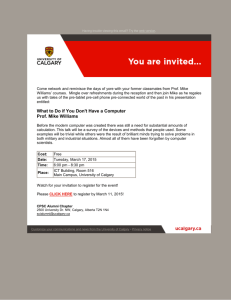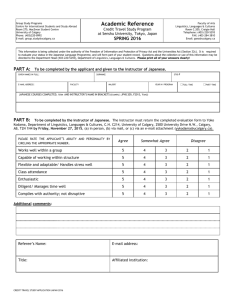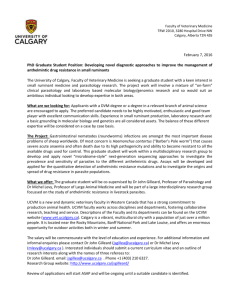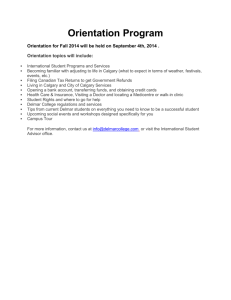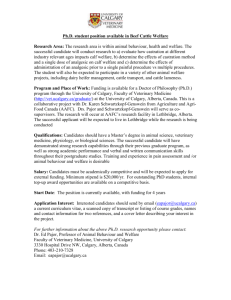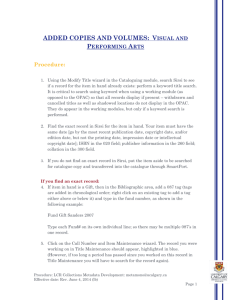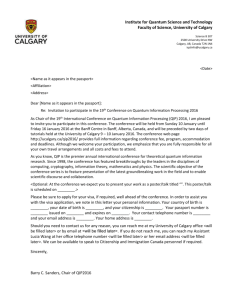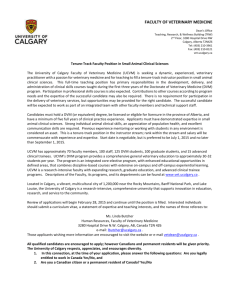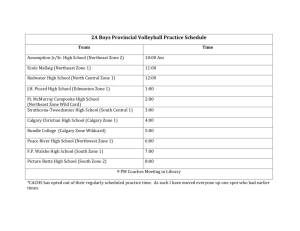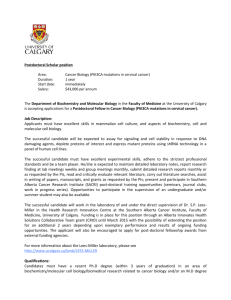www.ucalgary.ca/iss - University of Calgary
advertisement
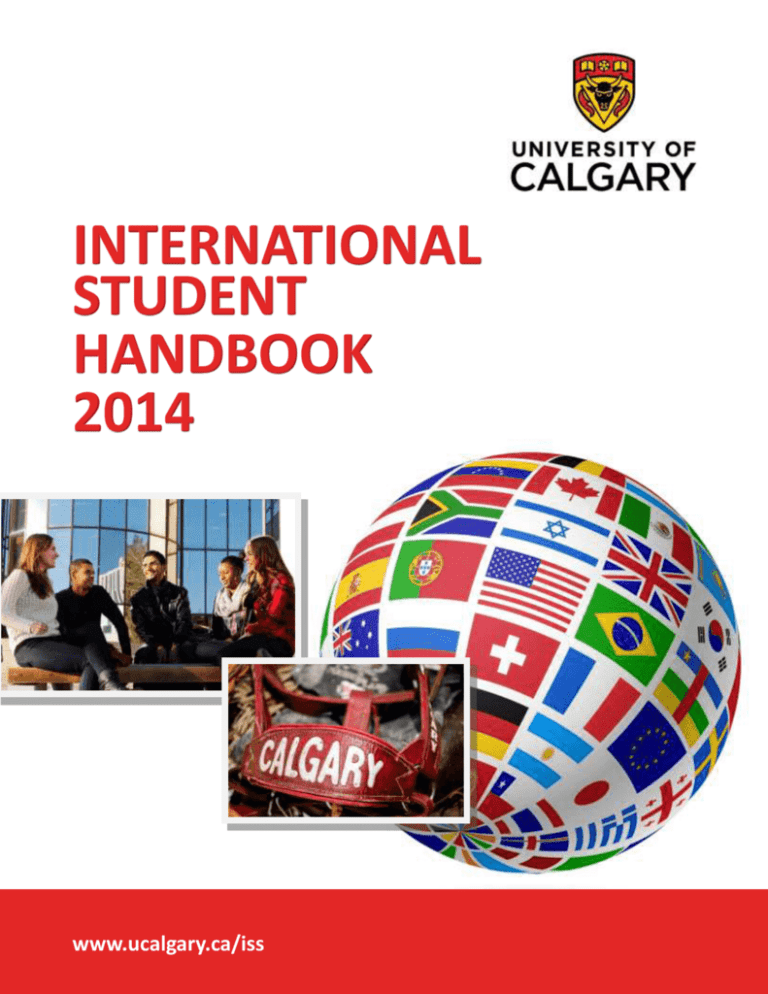
www.ucalgary.ca/iss WELCOME TO THE UNIVERSITY OF CALGARY We are pleased that you have chosen to attend the University of Calgary for your studies, whether it’s a full degree program or you are coming for a term or two as an Exchange, Visiting or Open Studies Student. You are not alone in deciding to come to Calgary. There are approximately 3,300 international students from around 120 countries currently attending UCalgary. You probably have many questions about coming to study in a new country and we want to assure you that both university staff and other students will be available to assist you. This handbook will answer many of your questions about preparing to come to Canada and your stay at the University of Calgary. You can also check out the information on our web site: www.ucalgary.ca/iss WELCOME If you have further questions, do not hesitate to contact the Centre for International Students and Study Abroad. We look forward to meeting you at the International Student Orientation when you arrive in Calgary. See you soon. International Student Services Team Ricky Ramdhaney Fazeela Kayyum Brianna (Bree) Huene Matt Knox TABLE OF CONTENTS The City of Calgary……………………………………… 4 International Student Checklist………………….. 5 The Centre for International Students and Study Abroad………………….………………….. 6 International Student Services…………………… 7 International Student Programs…………………. 8 Workshops and Academic Development …… 9 Study Abroad Programs……………………………. 10 Preparing to Come to Canada…………………… 11 Before Coming to Canada………………………… 13 After Arriving into Canada……………………….. 14 Extending Study Permit…………………………………. 14 Working……………………………………………………15 - 16 Travel To or Through the United States…….. 17 Visa Waiver Program and ESTA………………………. 18 Travelling to Other Countries……………………. 19 Arriving at Calgary International Airport…… 20 Climate and Clothing Considerations………… 21 2 UCALGARY ○ INTERNATIONAL STUDENT HANDBOOK TABLE OF CONTENTS Canadian Health Care…………………………………… 22 Student Health Plans……………………………………. 23 Health and Coverage for Exchange and Visiting Students……………………………………. 24 Money Matters……………………………………………. 25 Arranging Your Finances………………………………………………………… 25 Paying Tuition and Understanding Canadian Currency……………. 26 Understanding Canadian Currency and Tuition Differential Fees 27 Banking in Canada…………………………………………………………………...28 Accomodation: Living on Campus……………….… 29 Living in Residence…………………………………………………………………. 30 Temporary……………………………………………………………………………… 31 Living Off Campus………………………………………………………………….. 33 International Student Orientation………………… 35 Graduate Student Orientation……………………… 36 When You Arrive in Canada………………………….. 37 Checklist……………………………………………………………………………….. 38 Churches, Mosques and Synagogues……………..39 3 UCALGARY ○ INTERNATIONAL STUDENT HANDBOOK THE CITY OF CALGARY Today Calgary is one of Canada’s most livable cities with all the advantages of a large city with few of the problems. Calgary is home to more than one million people. The downtown core is composed of modern high-rise buildings and many international company headquarters. Calgarians are among the most highly educated in Canada, ranking above the national average for post-secondary education. The city offers an abundance of parks, an excellent variety of sporting facilities, good shopping, hotels and restaurants, a Performing Arts Centre, and a zoo. Art, music, theatre, and world-class museums enrich our multi-cultural city. Professional sporting franchises include hockey, and football. Each July, the city celebrates its western heritage through the world-famous Calgary Exhibition and Stampede. Residents of Calgary often cite the Rocky Mountains as the city’s most outstanding feature. The town of Banff (127 km west of Calgary) is the gateway to thousands of acres of national parklands, superb scenery, and some of the best sightseeing, hiking, skiing, fishing, and camping in the world. 4 UCALGARY ○ INTERNATIONAL STUDENT HANDBOOK UCALGARY ○ INTERNATIONAL STUDENT HANDBOOK 5 THECENTRE CENTRE INTERNATIONAL STUDENTS THE FORFOR INTERNATIONAL STUDENTS ANDSTUDY STUDY ABROAD (CISSA) AND ABROAD (CISSA) The Centre for International Students and Study Abroad (CISSA) is located in the MacEwan Student Centre, room 275. International Student Services (ISS) is located in CISSA and organizes programs and activities to assist international students with their adjustment to university life and to Canada. Our office also provides service to Canadian students who wish to study, work or volunteer in other countries. At first, you may find UCalgary a somewhat confusing place, so please, if you have questions, ask one of the staff at the Centre for International Students and Study Abroad - we will be glad to help you. The Centre for International Students and Study Abroad offers a number of programs and services specifically for international students. These services provide an opportunity for you to become involved in campus life, to learn about Canada, or to meet new friends. Programs and services include International Student Advising, International Student Orientation, Global Friendship Program, International Mentorship Program, Workshops, the University Study Abroad Library, and a number of Study Abroad Programs. 6 UCALGARY ○ INTERNATIONAL STUDENT HANDBOOK Staff can be reached at International Student Services (ISS) The Centre for International Students and Study Abroad Room 275, MacEwan Student Centre 2500 University Drive N.W. Calgary, Alberta, Canada T2N 1N4 Telephone: 1 (403) 220-5581 Fax: 1 (403) 289-4409 Email: international.advice@ucalgary.ca Website: www.ucalgary.ca/iss Student Advising As a newcomer to Canada, Calgary and the University of Calgary, there are many aspects of life here that will be unfamiliar. Students are strongly advised to attend the International Student Orientation. You are always welcome to contact a International Student Advisor if you have any questions. Your questions may include issues related to your Study Permit, working in Canada, university programs or regulations, changing educational institutions, receiving an emergency loan, owning a motor vehicle, banking, shopping, health insurance, signing a lease, or social customs. Advising hours are 9:00am to 12:00noon, and 1:00pm to 4:00pm, Monday to Friday on a drop in basis. No appointments are necessary. 7 UCALGARY ○ INTERNATIONAL STUDENT HANDBOOK International Student Programs Global Friendship Program: This program provides an opportunity for groups of Canadian and international students to meet on an informal basis to go skating, attend plays, concerts, or sporting events, view a movie, or simply to share hot chocolate and an evening of board games. We also organize day trips to places such as Banff, Lake Louise, the Royal Tyrell Dinosaur Museum in Drumheller, Head Smashed In Buffalo Jump, the West Edmonton Mall and the Kananaskis wilderness area for hiking. This program is also open to the families of our international Students. Children are welcome to any events that are appropriate for children. Lunch Hours at CISSA: The Centre for International Students and Study Abroad is open every weekday from 8:30 am - 4:30 pm. Both local and international students are welcome to gather, bring their lunch and socialize in our Centre. Language Bank: This program provides opportunities for students to teach their own language or to learn another language in a comfortable, informal environment. You can join the language Bank after you arrive in Calgary. The Language Bank is located in CISSA on a computer in our lounge. International Student Mentorship Program: This program matches current University of Calgary students with new, incoming international students. Mentors communicate with their mentees before their arrival on campus and provide guidance. As a new international student you probably have many questions about student life at UCalgary and about living in Calgary. Student Mentors will be able to answer these questions for you better than anyone else. If you are interested in requesting a mentor, or eventually becoming one, please visit our website: http://ucalgary.ca/iss/programs-services/ programs/mentorship 8 UCALGARY ○ INTERNATIONAL STUDENT HANDBOOK Workshops and Academic Development CISSA in collaboration with a variety of different departments on the UCalgary campus, such as the Student Success Centre, are working together to bring you informative sessions on issues that are directly related to international students, such as: Canadian banking, adjusting to the Canadian classroom & successful transitions between cultures. The Student Success Centre From when you first arrive at the University of Calgary through to when you graduate, the Student Success Centre provides services and programs to ensure you make the most of your time here at UCalgary. These programs and services are available to ALL undergraduate and graduate students including: Academic development specialists provide personalized academic planning and learning support advising sessions to help students achieve their academic goals. Assistance with managing your program degree requirements, using Degree Navigator, checking your GPA and academic standings and other related questions. Writing Support tutors are available by appointment or drop-in for all students wanting to learn strategies to write more effectively and gain a better understanding of how to improve their written assignments. Writing workshops are also held in the fall and winter semesters. Student Success Seminars are offered throughout the fall and winter semesters covering a variety of topics to help support your academic success. Jennifer Parsons Academic Development Specialist—International Students jen.parsons@ucalgary.ca +1 (403) 220-4865 9 UCALGARY ○ INTERNATIONAL STUDENT HANDBOOK UCALGARY ○ INTERNATIONAL STUDENT HANDBOOK 10 Understanding Citizenship and Immigration Canada Requirements As a temporary resident in Canada, it is important that you are aware of Canada’s immigration regulations and the conditions of your stay. If you fail to comply with the conditions stated on your Study Permit you could be required to leave Canada. You can access the Citizenship and Immigration Canada web site at www.cic.gc.ca. To find the location of the Canadian Immigration Office closest to your home go to the following website: www.cic.gc.ca/english/information/offices/applywhere.asp. The following information is provided to help you understand the language of immigration. A Study Permit is a Canadian immigration document that allows you to study in Canada. A Work Permit is a Canadian immigration document that allows you to work in Canada. You application for a Study Permit or Work Permit is processed at a Canadian Immigration Office outside of Canada. After arriving in Canada, Study Permits and Temporary Resident Visas can be renewed online or by mail at a processing Centre within Canada. A Temporary Resident Visa (TRV) is a document that allows you to enter Canada. It is a shiny sticker that is glued in your passport. Not all countries require a TRV to enter Canada. If you are uncertain whether or not you need to apply for a TRV to enter Canada, go to the website www.cic.gc.ca/english/visit/visas.asp. Your initial application for a TRV can only be processed outside of Canada. Problems encountered by those who come to Canada without proper immigration documents A foreigner would be violating immigration regulations if they were to arrive in Canada claiming to be a visitor and then deciding to attend or even sit-in on classes at the university. Please make sure that you have all of your proper documents in your carry on. You will be going through immigration before you get to your checked baggage. For the list of documents you should have on you for your entry into Canada, please see: http://www.cic.gc.ca/english/study/study-howdocuments.asp Your Study Permit will be printed by the immigration officer at the Canadian port of entry (airport or border crossing). Please staple it into your passport. BEFORE COMING TO CANADA: where to send your application www.cic.gc.ca/english/information/offices/apply-map.asp?q=3 13 AFTER ARRIVING INTO CANADA: extend study permit www.cic.gc.ca/english/study/study-extend.asp 14 AFTER ARRIVING INTO CANADA: working www.cic.gc.ca/english/study/work.asp 15 AFTER ARRIVING INTO CANADA: working www.cic.gc.ca/english/study/work.asp 16 Travel To or Through the United States Students travelling to Calgary through the United States may require a visa and should contact the U.S. embassy for information. You can find out about United States immigration requirements at the following website: calgary.usconsulate.gov. If you intend to visit the United States while studying in Calgary, you may require a United States Visitor's Visa. There is a United States Consulate in Calgary. There is no guarantee that you will be successful in obtaining a visa from this office. To avoid disappointment, you are advised to apply for a U. S. visitor visa from the United States Embassy in your home country before you leave for Canada. Students from countries who require a U.S visa to enter the United States, must first make an appointment. Information on how to set up an appointment is available from the following web site: https://usvisa-info.com/en-CA/selfservice/ss_country_welcome The U.S. Consulate in Calgary is located at: The United States Consulate General 10th Floor, 615 Macleod Trail SE Calgary, Alberta T2G 4T8 17 UCALGARY ○ INTERNATIONAL STUDENT HANDBOOK Visa Waiver Program for the United States The Visa Waiver Program allows nationals from certain countries to travel into the United States for a period of up to 90 days without the need to obtain a visa. Please note that your 90 days includes your stay in Canada if you transit through the USA on your way to Canada. For information, please see: http://travel.state.gov/visa/temp/without/without_1990.html ESTA: Electronic System for Travel Authorization In order to travel into the United States on the Visa Waiver Program, all individuals must first obtain authorization through ESTA before boarding their flight into or stopping into the United States. http://cbp.gov/xp/cgov/travel/id_visa/esta/ UCALGARY ○ INTERNATIONAL STUDENT HANDBOOK 18 Traveling to Other Countries If you are planning to travel to any other country, check with the embassy/ consulate of that country to determine what immigration documents you will need. You can obtain Consular contact information for all cities in Canada from the Foreign Affairs, Trade and Development Canada website at: http://w03.international.gc.ca/Protocol-Protocole/Consular-Consulats.aspx Be sure to allow several weeks to obtain visas, if they are required. The regulations vary depending upon the country you are visiting and your country of citizenship. Travel Times Approximate travel times to Calgary from selected cities: Los Angeles 3 hours Frankfurt 10 hours Beijing 12 hours Hong Kong 14 hours Sydney 17 hours New York 5 hours London 9 hours Tokyo 11 hours UCALGARY ○ INTERNATIONAL STUDENT HANDBOOK 19 Arriving at Calgary International Airport When you arrive at Calgary International Airport, you will see many White Hat Volunteers throughout the airport. These friendly and informative guides will provide you with a warm welcome to Calgary and will be more than happy to help you and answer any questions you may have. In addition, there are informative kiosks located in the Arrivals area should you require assistance. To get to the University of Calgary, you have two main options: 1. Taxi — a taxi stand can be found immediately outside of the Arrivals area (follow the signs for “ground transportation”). The cost from the airport to the University of Calgary campus is approximately $40. 2. Public Transit — the Calgary airport is served by public buses which can connect you to the to the “C-Train” which is Calgary’s Light Rail system. There is a C-Train station at the University of Calgary called “University Station”. The cost of the C-Train is $3. This option may be difficult if you are carrying large amounts of luggage or arriving at night. Please check the Calgary Transit website (www.calgarytransit.com) for details. If you will be living in University Residences on campus, make sure you check residence move-in information (http://www.ucalgary.ca/residence/movingin ) and follow the instructions outlined. During the move-in days, there will be many student volunteers at the entrances of residence buildings to help you with your luggage, answer questions, and provide you with directions. UCALGARY ○ INTERNATIONAL STUDENT HANDBOOK 20 NOTE: If you are arriving for the Winter (January) semester, please note that all university offices are closed for approximately one week between our Christmas and New Years holidays. Most University offices close the afternoon of December 24 and re-open at 8:30am on January 2. 20 October UCALGARY ○ INTERNATIONAL STUDENT HANDBOOK 21 CANADIAN HEALTH CARE In some countries, people are covered for medical or dental treatment without any cost. They go to a doctor, dentist or hospital and they receive treatment at no cost. This is NOT the case in Canada. In Canada, each province has a health care plan that covers services such as physician’s fees, hospitalization and laboratory services. In Alberta the health care plan is called Alberta Health Care. All International Students studying at the University of Calgary need to make certain that they have adequate medical insurance to cover any medical care or accidents while they are here. If students do not have an insurance plan they will be responsible for paying all costs for medical treatment themselves. A visit to the doctor can cost $40 - $60 or more and a hospital stay can cost more than $1,000 per day. A student who does not have medical insurance would be required to pay the entire bill for these medical services. If you intend on being in Calgary for longer than 12 months, you may register for the Alberta Health Care Insurance Plan (AHCIP). There is no cost for this plan. The plan covers visits to the doctor, lab costs, as well as hospital costs should you be admitted to a hospital. To be eligible for Alberta Health Care, you should provide a copy of your Study Permit that shows you are allowed to study for 12 months or more. You must register within 3 months of your arrival into Alberta. Your dependents residing in Canada may also be covered. If your spouse and family are in Alberta, their immigration documents must show that they are authorized to be in Canada for at least 12 months in order for them to receive Alberta Health Care. If you renew your Study Permit to continue your studies, you will need to send a copy to Alberta Health Care to remain covered by this plan. To arrange for Alberta Health Care, you can mail your application (with a copy of your Study Permit) to the address listed on the application form or you can go in person with your passport and Study Permit to a Calgary Registry office. If you have questions call (403) 297-6411. http://www.health.alberta.ca/health-care-insurance-plan.html 22 UCALGARY ○ INTERNATIONAL STUDENT HANDBOOK Student Health Plans If you are a full-time student admitted to a degree program at the University of Calgary you are automatically registered in a “supplemental plan” through the Students’ Union (for undergraduate students) or the Graduate Students’ Association (for graduate students). The supplemental plan covers items not covered under AHCIP, such as partial cost of prescription drugs, dental work, vision care, ambulance rides, etc. These plans supplement (but do not replace) Alberta Health Care coverage. Membership is automatic through payment of student fees. Students can pay a fee to have their families added to the student health and dental plans, however, application must be made before the tuition fee payment deadline. Students who wish to opt out of the student health plan will need proof of equivalent coverage elsewhere. Check the university Calendar for opt-out deadline dates: www.ucalgary.ca/pubs/calendar/current/p-1-15-2.html. Additional information is available from The Students’ Union or the Graduate Students’ Association. It is very important that you understand that the student health plan DOES NOT PAY FOR SERVICES SUCH AS VISITS TO THE DOCTOR, LABORATORY TESTS, OR HOSPITAL VISITS. You must apply for either Alberta Health Care Insurance (if you are eligible) or purchase a private plan in order to be covered for these services. UCALGARY ○ INTERNATIONAL STUDENT HANDBOOK 23 HEALTH COVERAGE FOR EXCHANGE AND VISITING STUDENTS If you have a Study Permit valid for less than 12 months, you must purchase a private plan through an insurance company or agent. You can purchase this private insurance in your home country or in Canada. Medical insurers in Canada are authorized to provide this service to those who apply within 5 days of arriving in Canada. We do not recommend any particular plan or agent. We advise students to talk with 2 or 3 insurance agents to compare prices and services before making a decision on which plan to buy. When you have a private health plan you are expected to pay for medical costs yourself; it is your responsibility to submit receipts to your private insurance company in order to be reimbursed. If you purchase a private plan you may not require the student supplemental plan, as it likely duplicates the benefits offered through your private plan. Students can opt out of the Student Health and/or Dental Plan if their private insurance has comparable coverage. To do this you must notify the appropriate graduate or undergraduate student health plan office prior to the deadline for opting out of the plan. 24 Money Matters—Arranging Your Finances International students are not eligible for Canadian student loans. However, please go to the UCalgary’ s Student Awards & Financial Aid website for information about awards for International Students: http://www.ucalgary.ca/studentfinance/ The cost of living in Calgary may be higher than in your country. Apart from the cost of living in this country, fluctuations in currency exchange rates can greatly affect the buying power of the money you bring from home. Actual costs will vary depending upon your life-style. Accommodation and food prices may be higher than you expect. Miscellaneous costs such as clothing, personal needs, recreation, transportation, laundry, telephone, postage and health care should be budgeted for because they are unavoidable and add to your expenses. Warm winter clothing is an essential expense. It is recommended that you itemize a budget for yourself and allow for all of these expenses. It is recommended that students arrive in Canada with approximately $2,000. Students will have some immediate expenses such as rent, food, books, and personal expenses. 25 UCALGARY ○ INTERNATIONAL STUDENT HANDBOOK Money Matters—Paying Tuition and Understanding Canadian Currency There are three main options for paying your tuition to the University of Calgary: Online Banking, Cheque/Money Order/Bank Draft or through a Wire Transfer Payment. For more information on any or all of these options, please see the universities Fees & Finances webpage: http://www.ucalgary.ca/registrar/fees/payment There is a currency exchange at the Calgary International Airport where some currency can be exchanged, but large transactions should wait until you have access to a bank and the lowest exchange rate possible. The unit of currency in Canada is the Canadian dollar ($). The Canadian dollar divides into 100 cents. Canadian coinage is as follows: UCALGARY Twoonie $2.00 Loonie $1.00 Quarter $0.25 Dime $0.10 Nickel $0.05 ○ INTERNATIONAL STUDENT HANDBOOK 26 Money Matters— Understanding Canadian Currency and Tuition Differential Fees Paper notes are most commonly issued in $5, $10, $20, $50 and $100 bills. Credit cards such as Visa, MasterCard and American Express and Debit Cards (Bank Cards) are widely accepted if you have a chip and 4-digit pin number. You may wish to apply for credit cards when you arrive but you should be aware that occasionally students run into problems by over-extending themselves financially. Students who experience temporary financial difficulties may apply for an emergency loan from the International Student Advisor. These are small, shortterm, no-interest loans. These loans cannot be used to pay for university expenses such as tuition or Residence Services costs. If you have questions regarding finances, contact the International Student Advisor at international.advice@ucalgary.ca Tuition Differential Fee Undergraduate international students are assessed a tuition differential fee (this means you will pay around three times the amount Canadians pay for tuition). The reason for this is that Canadian student tuition is subsidized by the Canadian Government through Canadian income taxes that are paid into the system. Graduate, law and medicine international students pay a tuition differential fee (this means they will pay around two times the amount assessed to Canadians). Detailed information about tuition fees is provided in The University of Calgary calendar. You can access the calendar at http://www.ucalgary.ca/pubs/calendar/ for up-to-date information about tuition and general fees. You should be aware that tuition fees will likely increase over your period of study. Textbooks vary in cost depending on the student’s program of study. New books and supplies are sold at the University Bookstore located on campus in the MacEwan Student Centre. Used books can be purchased at reduced rates from the University Bookstore and The Students’ Union Used Book Store. 27 UCALGARY ○ INTERNATIONAL STUDENT HANDBOOK Banking in Canada You can open a bank account upon arrival in Calgary. For detailed information about contacting major banks near the University of Calgary go to our website: http://ucalgary.ca/iss/when-you-arrive/banking. Banks and Credit Unions are generally open from 10:00am to 4:00pm Monday to Friday. Many are open on Saturday and some weekends—only a select few are open on Sunday. Several types of accounts and services are available. Ask the bank for the best type of account for a student. Also, ask about a “bank card” - this card will allow you to access bank machines throughout the city and on the university campus; these automated bank machines allow you to make deposits and withdrawals at various locations around the city and are open 24hour-a-day. 28 UCALGARY ○ INTERNATIONAL STUDENT HANDBOOK ACCOMMODATION: Living on Campus IF YOU WISH TO LIVE ON-CAMPUS IN STUDENT HOUSING IT IS VERY IMPORTANT THAT YOU SUBMIT YOUR APPLICATION EARLY! There is a high demand for on-campus housing and it tends to fill up very early. Check the housing web site at www.ucalgary.ca/residence for application information, descriptions of the various accommodation options available, accommodation rates, Dining Plan rates, contact information, hours of operation, copies of residence contracts and the Residence Student Handbook. There are several different offices that handle on-campus housing requests; be sure to direct your inquiries and applications to the appropriate office. UCALGARY Residence Service Office (only for single students) Telephone: +1 (403) 220-3210, Fax: +1 (403) 282-8443 Email: residence@ucalgary.ca Student Family Housing Office (only for couples and students with families) Telephone: +1 (403) 220-7227, Fax: +1 (403) 289-2587 Email: family.housing@ucalgary.ca Summer and Conference Housing (for short stay guests) Telephone: +1 (403) 220-3203, Fax: +1 (403) 220-6770 Email: confserv@ucalgary.ca ○ INTERNATIONAL STUDENT HANDBOOK 29 Living in Residence: If you plan to arrive before your designated check-in date be sure to make arrangements for temporary off-campus accommodation until the date your room is available to you. Read your “offer of accommodation” to find out what day you can move into your room. Many students are disappointed when they arrive early only to find they cannot get into the room they were offered because someone else has a contract to stay until the day before your contract begins. If you plan to arrive after your check-in date you must notify Residence Services so your room will be held for your late arrival. If you will be arriving outside of Residence Services office hours you must make arrangements for temporary off-campus accommodation until the residence office is open. Refer to the Temporary Accommodation section in this handbook for a list of suggestions for temporary accommodation. If you wish, you can purchase bedding from the Residence Service office, however, most students prefer to bring their own sheets, pillows and blankets. If you are assigned accommodation with kitchen facilities you will be required to supply your own dishes and cooking utensils. If you are assigned to traditional dormitory accommodation (no kitchen) you will be required to purchase a Meal Plan. The Dining Centre provides the Meal Plan service to students living in residence. Students living in traditional dormitories will need to be aware that the Dining Centre closes for approximately two-weeks during our Christmas holiday season. It will be necessary to explore other options for food service during this season. 30 UCALGARY ○ INTERNATIONAL STUDENT HANDBOOK ACCOMMODATION: Temporary If you need a place to stay while you look for permanent accommodation, the following is a list of options for temporary accommodation. UNIVERSITY OF CALGARY SUMMER CONFERENCE HOUSING (only available May—August) http://www.summerresidence.ca/ CALGARY INTERNATIONAL YOUTH HOSTEL 520—7 Avenue SE, http://www.hihostels.ca Tel: 1-866-762-4122; 1-403-269-8239 Email: cr.calgary@hihostels.ca HOTEL ALMA—ON CAMPUS Tel: +1 (403) 220 - 3203 Email: stay@hotelalma.ca Website: http://www.hotelalma.ca/ SUPER 8 MOTEL VILLAGE —1.5km from UCalgary 1904 Crowchild Trail NW Tel: +1 (403) 289-9211 Email: super8motelcalgary@shaw.ca Website: www.super8.com BEST WESTERN VILLAGE PARK INN —1.5km from UCalgary 1804 Crowchild Trail NW Tel: +1 (403) 289-0241; Toll Free: 1-888-774-7716 Website: www.bestwestern.com RAMADA LIMITED —1.5km from UCalgary 2363 Banff Trail NW Tel: +1 (403) 289-5571 Email: ramada.ltd.calgary@shaw.ca Website: www.bestwestern.com 31 UCALGARY ○ INTERNATIONAL STUDENT HANDBOOK COMFORT INN & SUITES UNIVERSITY—1.5km from UCalgary 2369 Banff Trail NW Tel: +1 (403) 289-2581 Website: www.comfortinn.com TRAVELODGE CALGARY UNIVERSITY—1.5km from UCalgary 2227 Banff Trail NW Tel: 1-800-525-4055; 1-403-289-6600 Email: travelodgeuniversity@gmail.com Website: www.travelodge.ca HAMPTON INN & SUITES CALGARY UNIVERSITY 2231 Banff Trail NW Tel: +1 (403) 289-9800 Website: hamptoncalgary.com ECONO LODGE MOTEL VILLAGE 2440 16 Avenue NW Tel: +1 (403) 289-2561; 1-800-917-7779 Website: www.econolodge.com ALOFT CALGARY UNIVERSITY —1.5km from UCalgary (new hotel opening in 2014) 2359 Banff Trail NW Tel: 1-403-289-1973 Website: www.aloftcalgaryuniversity.com Please be aware that room rates change depending on the season you arrive. During the holidays or summer months expect to pay more per night. The Centre for International Students and Study Abroad (CISSA) does not endorse any location, we are simply providing this information for your benefit. 32 UCALGARY ○ INTERNATIONAL STUDENT HANDBOOK Living Off-Campus Our office does not find off-campus housing or “homestays” for students for the following reasons: We do not have enough resources available to provide this service. You need to choose accommodation that will be appropriate for your needs. The owner of the place you rent normally requires a signed contract from you. The signed contract will outline payment and living arrangements. The person who signs the contract (a lease or rental agreement) is responsible for abiding by the agreement; we cannot do this on your behalf. However, the English Language Program does offer Homestay services. You can access their information by going to www.ucalgary.ca/esl/homestay/ We can, however, provide information and contacts to help you find appropriate accommodation. The information about off-campus housing can be obtained by a variety of sources: UCALGARY The Students’ Union (403) 220-6551, room 251 MacEwan Students Centre provides a list of accommodations available. The off-campus Housing List is updated daily and can be accessed at www.su.ucalgary.ca/ooch A wide variety of online resources list available accommodation located in Calgary. Sites include www.rentfaster.ca, www.rentspot.com and www.calgary.rentersonline.com (CISSA offers these links for your information, we do not endorse the content). ○ INTERNATIONAL STUDENT HANDBOOK 33 Living off-campus requires you to allot time for travelling to and from the university. Commuting to the university from off-campus accommodation is facilitated by Calgary’s extensive public transportation system, which makes most areas of the city accessible. Sharing rental costs with roommates can lessen living costs. If you decide to share accommodation with roommates, you may decide to purchase furniture and appliances together. If this is the case, it is wise to make agreements regarding ownership or financial repayments in advance. This will help avoid ownership/ financial conflict if you decide to move out. When renting accommodation, two costs will be incurred when you first move in, particularly if you are renting an apartment: 1. You will have to pay the full month’s rent in advance. Payment for accommodation is always in advance. 2. You will have to pay a damage deposit in advance, usually equal to the amount of one month’s rent. You are responsible for giving advance notice if you wish to vacate your apartment. You must give your landlord notice in writing, usually one calendar month in advance. Proper notice must be given to the landlord before the first day of the month. Be very careful about deadlines or you might end up paying an extra month’s rent to the landlord. Read your rental contract carefully. Be sure you understand your rights and responsibilities before you sign a rental agreement. Your accommodation budget should also allow for the cost of electricity, water/ sewer, heat, cable TV, and internet services, which may or may not be included in rent. As a new user of these services you may be required to pay an initial deposit. You will then be responsible for paying a monthly fee for use of each service. Information for landlords and tenants is available at: http://www.servicealberta.gov.ab.ca/ If you are in Canada, you can also get this information by phone 1-877-427-4088 Calgary Communities: http://www.calgaryarea.com/ 34 UCALGARY ○ INTERNATIONAL STUDENT HANDBOOK INTERNATIONAL STUDENT ORIENTATION (ISO) When first arriving, the university can seem a strange place and you might wonder how you will find out what to do. The University of Calgary organizes an “Orientation Week” in the Fall semester which typically runs the week before classes are scheduled to start in September. Included in Orientation Week are the following: International Student Orientation The Faculty of Graduate Studies Orientation Specific faculty orientations and various tips on how to be successful at UCalgary The International Student Orientation is designed specifically for all international students (graduate, undergraduate, exchange or visiting). This orientation is ran in both Fall and Winter semesters. Topics of discussion include: International Student Programs and Services Using the UCalgary Libraries and Resources Filing Canadian Tax Returns to get Government Refunds Living in Calgary and City of Calgary Services Opening a bank account, transferring funds, and obtaining credit cards Health Care & Insurance, visiting a doctor and services at the UCalgary Wellness Centre Emergency Loans for International Students Students Rights and where to go for help UCalgary Regulations and services Tips from current UCalgary students on everything you need to know to be a successful student Working in Canada Upcoming trips, social events and workshops designed specifically for you Campus Tour Register for the ISO at www.ucalgary.ca/iss/when-you-arrive/orientation UCALGARY ○ INTERNATIONAL STUDENT HANDBOOK 35 GRADUATE STUDENT INFORMATION: Master and PhD Programs Before you leave home: Contact your supervisor, if you already have one, or the program contact listed in your Offer of Admission, and inform him or her of your planned arrival date in Calgary. Arrange to meet your supervisor as soon as possible after arrival to discuss your program. When you arrive at the University of Calgary: Obtain and read a copy of your graduate program handbook to find out about important deadlines and regulations. Contact the Faculty of Graduate Studies if you have not already received information about the Graduate Students Orientation and the Graduate Students’ Association for information about their workshops for students receiving Graduate Assistantship (teaching). Apply for a Social Insurance Number (SIN) if you will be receiving a salary During the Graduate Student Orientation you will learn about the Graduate Students’ Association, registration, fees, supervision, scholarships, ethics, library services and information technologies. Some graduate departments offer their own orientation. Normally students are notified if their faculty has it own orientation session. The Graduate Students’ Association (GSA) represents the concerns of graduate students on various university committees and governing bodies. All students registered as graduate students are automatically members of the GSA and are assessed an annual fee. The GSA is located in room 214 of the MacKimmie Library Tower (MLT) . It operates a lounge and a restaurant and publishes a newsletter. For more information, email ask@gsa.ucalgary.ca or go to their website: gsa.ucalgary.ca 36 UCALGARY ○ INTERNATIONAL STUDENT HANDBOOK WHEN YOU ARRIVE IN CANADA Be sure to have all of the required documents prior to leaving your home country and carry them with you; do not pack them in a suitcase. These documents should include: UCALGARY Your passport Your Temporary Resident Visa (TRV) if required. It will be a foil sticker in your passport, to check if you need a TRV, please see the Citizenship and Immigration Canada (CIC) website www.cic.gc.ca/english/visit/visas.asp. Your immigration letter from CIC notifying you that your application for a Study Permit is approved and you may now proceed to Canada (please see the following CIC link for exceptions www.cic.gc.ca/english/study/study-who.asp) Your Letter of Acceptance from the University of Calgary Proof of Adequate Funding (information on proof of adequate funding can be found on the following CIC link www.cic.gc.ca/english/study/study-howdocuments.asp#doc3) ○ INTERNATIONAL STUDENT HANDBOOK 37 CHECKLIST: WHEN YOU ARRIVE IN CANADA Provide all required entry documents for immigration officer upon arrival in Canada. Contact your family to let them know you have arrived safely. Visit the Centre for International Students and Study Abroad (CISSA) located in MacEwan Student Centre room 275—they will be able to provide you with a Campus Map and an up-to-date checklist of where to obtain your student card and other important school documents. Attend the International Student Orientation. Attend the activities going on for Orientation Week—if you are a grad student, attend the Graduate Student Orientation. Obtain your UNICARD (your Student ID card). Open a bank account. Register for Alberta Health Care (only if you have a study permit which is valid for 12 or more months, for information please see: www.health.alberta.ca/ AHCIP/temporary-residents.html). Obtain a Social Insurance Number (SIN) if you will be working on campus. Talk to the International Students Academic Development Specialist to confirm appropriate courses for your degree. Register for courses (if you have not already done so). Update your Calgary address and telephone number using your My UofC Portal. ENJOY YOURSELF! 38 UCALGARY ○ INTERNATIONAL STUDENT HANDBOOK CHURCHES, MOSQUES AND SYNAGOGUES Many religions are represented at the University of Calgary. For this reason, there is a multi-faith prayer room located in the Faith and Spirituality Centre. The Centre is located in MacEwan Student Centre, room 373 next to the Wellness Centre. You can contact them via telephone at +1 (403) 210-9355 or by email at fscnews@ucalgary.ca. DISCLAIMER This handbook was produced to assist International Students studying at the University of Calgary. The Centre for International Students and Study Abroad has attempted to verify all information contained in this handbook. The Centre for International Students and Study Abroad cannot be responsible for any errors or omissions. Please note that it is the student’s responsibility to ensure all academic and immigration conditions are met, that he/she arrange for housing, transportation to the University of Calgary, and other necessary arrangements. UCALGARY ○ INTERNATIONAL STUDENT HANDBOOK 39
